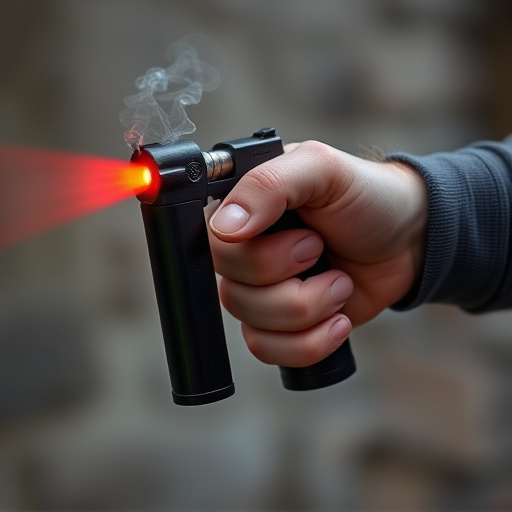“Concentrated capsicum spray, a powerful tool for pet protection, has gained prominence as an effective deterrent. This article delves into the intricacies of this pepper spray, its composition, and immediate effects on animals. We’ll guide you through identifying symptoms of exposure and offer essential first-aid measures. Additionally, we explore prevention strategies to safeguard your pets and provide effective treatment options for post-exposure care, ensuring comprehensive understanding of treating pets exposed to pepper spray.”
- Understanding Concentrated Capsicum Spray: Its Composition and Effects
- Identifying Pets Exposed to Pepper Spray: Symptoms and Immediate Care
- The Role of Concentrated Capsicum Spray in Pet Safety: Prevention Strategies
- Effective Treatment Options for Pets After Exposure to Pepper Spray
Understanding Concentrated Capsicum Spray: Its Composition and Effects
Concentrated capsicum spray, often referred to as pepper spray, is a powerful tool for personal protection. Its primary active ingredient is capsaicin, the chemical responsible for the heat and irritation associated with chili peppers. This compound disrupts nerve signals in the eyes, nose, and respiratory system, causing temporary blindness, coughing, and difficulty breathing.
When pets are exposed to pepper spray, the effects can vary depending on their species, size, and sensitivity. Small animals like cats and dogs may experience severe irritation, panting, and even panic. Treating them promptly involves rinsing their eyes with plenty of water for at least 15 minutes to dilute the capsaicin. If symptoms persist or worsen, it’s crucial to seek veterinary care immediately to ensure the well-being of your beloved pets.
Identifying Pets Exposed to Pepper Spray: Symptoms and Immediate Care
If your pet has been exposed to concentrated capsicum spray, it’s crucial to identify symptoms promptly for effective treating pets exposed to pepper spray. Common signs include excessive panting, drooling, tearing up of eyes, and reluctance to move or eat. In severe cases, you may notice coughing, vomiting, or even respiratory distress. If your pet displays any of these, isolate them from other animals and seek veterinary assistance immediately.
Immediate care is vital when treating pets exposed to pepper spray. Rinse the affected area with large amounts of water for at least 15 minutes to dilute the capsaicin. Do not use soap as it can exacerbate irritation. If your pet has sprayed in their eyes, gently flush them with clean water for at least 10 minutes while holding the eyelids open. Provide a warm, quiet space for rest and monitor them closely for any changes in behavior or health status until you can receive professional veterinary care.
The Role of Concentrated Capsicum Spray in Pet Safety: Prevention Strategies
Concentrated capsicum spray, often used for personal protection against aggressive dogs or wild animals, has a significant role in pet safety as well. When pets, especially dogs, are exposed to pepper spray accidentally during walks or outdoor activities, proper treatment is crucial. The active ingredient, capsaicin, can cause severe irritation and discomfort in the eyes, nose, and respiratory system of both humans and animals.
Prevention strategies include keeping pepper spray away from curious pets and using it responsibly when necessary. In case of exposure, treating pets immediately with a good quality concentrated capsicum spray decontaminant can help reverse the effects. Rinse affected areas thoroughly with water, seek veterinary assistance if irritation persists, and ensure your pet stays calm and is monitored for any adverse reactions. Treating Pets Exposed to Pepper Spray is a vital step in ensuring their well-being and minimising long-term impacts.
Effective Treatment Options for Pets After Exposure to Pepper Spray
After exposure to concentrated capsicum spray, it’s crucial to act swiftly and effectively to treat pets. The first step is to immediately rinse the affected area with copious amounts of water for at least 15 minutes to flush out any remaining spray residue. This can be done gently using a low-pressure stream from a garden hose or a sink faucet.
Next, contact your veterinarian promptly. They can provide specific guidance tailored to your pet’s needs and the extent of exposure. Soothing eye washes and topical creams may be recommended to alleviate discomfort in the eyes, nose, and skin. Additionally, your vet might suggest administering antihistamines or other medications to reduce inflammation and irritation. Regular monitoring for any adverse reactions or signs of distress is essential during the recovery process.
Concentrated capsicum spray, while an effective deterrent, can have significant effects on pets. Understanding its composition and symptoms of exposure is crucial for immediate care and long-term treatment. By implementing prevention strategies and knowing the best practices for treating pets exposed to pepper spray, we can ensure their safety and well-being. Remember, prompt action and access to veterinary care are essential in these situations, making it vital to have a comprehensive understanding of Treating Pets Exposed to Pepper Spray.
